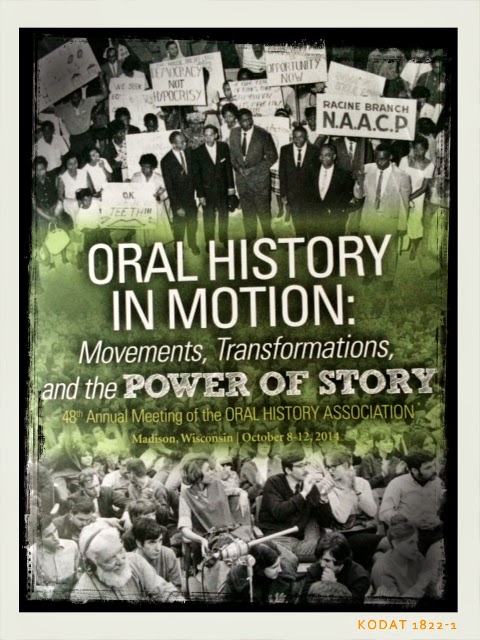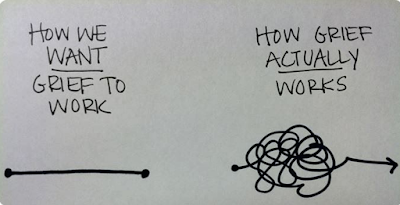Erasing Labor Day?
A friend of mine posted this picture yesterday:
She took it at her dry cleaners. It led to a very funny thread on her Facebook wall:
"Someone might need a tutorial on holidays?"
"Police? Well, they are usually unionized, right?"
"Union organizers! They keep us strong and free."
"My shop steward definitely keeps me safe from management."
And it went on from there. One person made the case that the dry cleaners' experience was directly connected to the events at the Triangle Shirtwaist Factory in New York and made them, possibly, more amenable to learning the stories of America's labor organizing histories. "History is a weapon."
Several people mentioned American flags flying everywhere in honor of Labor Day. Here in Tennessee, college classes ran on schedule and even the campus post office was open for half the day.
Labor Day seemed a non-event.
Are we erasing Labor Day from our national commemorative calendar? Are we in danger of forgetting the importance of organized labor to our history?
It is a distinct possibility.
Over a century ago, Labor Day got its start as workers walked off the job either for a short period or on general strike. What did they want? It was simple: they were fighting for shorter working hours, safer and healthier working conditions, and better pay.
We forget how hard they fought, how much they sacrificed and how each demand was wrested from employers. We take it for granted. We forget to honor the men and women who organized and fought, formed unions, and found creative and important ways to negotiate the cost of their labor with bosses and employers who profited from that labor.
Today, Americans take job insecurity, under-employment, at-will/no-obligation working terms and job conditions that often demand our availability, skills and competencies far above and beyond a forty-hour work week for granted. We don't complain. Why not?
I think we've conflated the workers who helped establish and create value for Labor Day with unskilled, wage labor and believe ourselves to be far away from those "bad old days." (Spoiler alert: we have not come nearly as far as we think we have. The vast majority of us are two paychecks away from massive financial worry in the face of a tsunami of debt we can't pay back.)
Even when Labor Day is celebrated, like at the parade and community celebration in Palmer, TN, that I went to ---- the point of the day has changed. Instead of politics or conversations about the right to work and the right to safe work for a living wage, we were surrounded by Confederate flags and a heavy police presence. It was just another national holiday, and in rural, poor, white, south-central Tennessee (in the second-poorest county in the state, no less,) it became another opportunity to perform Southern and American white patriotic fealty and an exclusive and exclusionary unity.
Here, where the coal mines shortened lives and the mining companies sacrificed men for profit, I think the union members and their organizers would be dismayed to see how they are (not) being remembered.
She took it at her dry cleaners. It led to a very funny thread on her Facebook wall:
"Someone might need a tutorial on holidays?"
"Police? Well, they are usually unionized, right?"
"Union organizers! They keep us strong and free."
"My shop steward definitely keeps me safe from management."
And it went on from there. One person made the case that the dry cleaners' experience was directly connected to the events at the Triangle Shirtwaist Factory in New York and made them, possibly, more amenable to learning the stories of America's labor organizing histories. "History is a weapon."
Several people mentioned American flags flying everywhere in honor of Labor Day. Here in Tennessee, college classes ran on schedule and even the campus post office was open for half the day.
Labor Day seemed a non-event.
Are we erasing Labor Day from our national commemorative calendar? Are we in danger of forgetting the importance of organized labor to our history?
It is a distinct possibility.
Over a century ago, Labor Day got its start as workers walked off the job either for a short period or on general strike. What did they want? It was simple: they were fighting for shorter working hours, safer and healthier working conditions, and better pay.
We forget how hard they fought, how much they sacrificed and how each demand was wrested from employers. We take it for granted. We forget to honor the men and women who organized and fought, formed unions, and found creative and important ways to negotiate the cost of their labor with bosses and employers who profited from that labor.
Today, Americans take job insecurity, under-employment, at-will/no-obligation working terms and job conditions that often demand our availability, skills and competencies far above and beyond a forty-hour work week for granted. We don't complain. Why not?
I think we've conflated the workers who helped establish and create value for Labor Day with unskilled, wage labor and believe ourselves to be far away from those "bad old days." (Spoiler alert: we have not come nearly as far as we think we have. The vast majority of us are two paychecks away from massive financial worry in the face of a tsunami of debt we can't pay back.)
Even when Labor Day is celebrated, like at the parade and community celebration in Palmer, TN, that I went to ---- the point of the day has changed. Instead of politics or conversations about the right to work and the right to safe work for a living wage, we were surrounded by Confederate flags and a heavy police presence. It was just another national holiday, and in rural, poor, white, south-central Tennessee (in the second-poorest county in the state, no less,) it became another opportunity to perform Southern and American white patriotic fealty and an exclusive and exclusionary unity.
Here, where the coal mines shortened lives and the mining companies sacrificed men for profit, I think the union members and their organizers would be dismayed to see how they are (not) being remembered.










Comments
Post a Comment